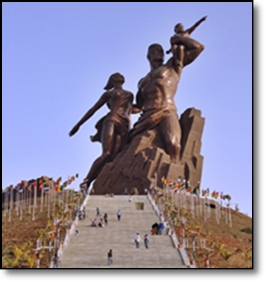Africa’s Independence: An Unfinished Business ?

 |
| Is Africa's renaissance bearing fruit? |
The former President of the United Republic of Tanzania, H.E. Ali Hassan Mwinyi, laments the fact that African countries have political independence but no economic independence. According to him, “the attainment of political independence by the African countries did not lead to economic independence. African countries soon realized there was still a long road towards attaining economic independence.”
When one looks at how global governance works, even the political independence Africa has becomes questionable. The road to full independence will forever be elusive unless African people and leadership make necessary internal policy changes to speed up economic integration with a view of enabling economies of scale. Africa’s share of global trade is still at 2%, while Intra Africa trade is at 10% compared to 40% in North America and 60% in Western Europe.
Africa has perennially played the role of providing natural resources in the global trade since independence, enabling other countries to succeed.We are still doing this 50 years after independence. Most African governments have failed to put in place policies and structures that would make them benefit from natural resources. They have taken the aid option and revenues from crude natural resources. Africa countries ought to be adding value to natural resources and building strong and transparent institutions necessary for long term development!
Some countries have made significant strides in improving investment climate in order to attract investors but a lot more work needs to be done. Most of these improvements target foreign investors while Small and Medium scale Enterprises (SMEs) and the informal sector, which form the backbone of Africa’s economies receive little attention.
According to the International Labor Office estimates, the informal sector comprises 72% of employment in Sub-Saharan Africa. It is therefore imperative that African governments further improve the region's investment climate and reduce the costs of doing business. This must not be done only for large multinational companies, but more importantly, for SMEs and the informal sector to make them efficient, productive and employ more people.
Africa has huge economic potential: a billion mostly young people; 40% of the world’s hydroelectric power capacity and vast geothermal and solar resources; 60% of the World’s uncultivated arable land and much more. Africa has great potential for long term economic take off. Africa’s leaders and individual citizens need to make fundamental shifts in the way they do business by focussing on productivity and value addition. This will ensure sustainable economic growth and improved living standards.
Africa’s leaders have welcomed the growing presence of China - that has hunger for new resources to keep its growing economy running and a ‘Never mind about democracy’ unlike western powers. Great for China! But how does it help Africa’s interests? Africa needs more than just a change in partners from West to East. Changing partners alone won’t solve Africa’s many problems: creating wealth to fight poverty, building infrastructure and improving investment climate for SMEs and the informal sector is vital. The essence of economic development and growth is about wealth creation, adding value to resources and diversifying the economy – not exporting crude natural resources to fuel overseas’ industries.
There are good signs in terms of Africa’s economic prospects: African economies rose on average 4.9% annually from 2000 through 2008, more than twice its pace in the previous decade. This rapid growth was largely due to resource boom and better policy making. The recent 2010 Mo Ibrahim Index on good governance also beckoned some good news in two of the four groups’ indicators: 40 out of 53 African countries have made improvements in sustainable economic opportunity and human development.
As the former UN Secretary General Koffi Annan puts it, “Africa is a sleeping giant about to be awoken.” We can awake the sleeping giant, only if we move from patterns of aid and export of crude natural resources to building globally competitive industries capable of providing jobs to our younger population. This calls for strong leadership and collective action.
By Obadias Ndaba.
The author is the Regional Director of the World Youth Alliance Africa. The views expressed in this article are his own. obadias@wya.net
